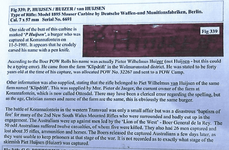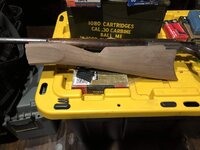- Messages
- 9,364
- Reactions
- 23,647
If anybody is interested, I have information giving details of the former owner of my Boer War carbine, and also the amazing coincidences surrounding the Mauser Model B hunting rifle in this little movie.
Follow along with the video below to see how to install our site as a web app on your home screen.
Note: This feature may not be available in some browsers.

Hi tac - see your online. we spoke/messaged each other on the ms350b mauser awhile ago. wondering if you visited your friend in England and found out if he 'would give away' one of his ms350b's he lists - just kidding. still trying for the 'holy grail' of a ms350b. picked up a ms420b and another es340b. hope all is well with you. save travels.Top - 1897 Ludwig Loewe carbine - Mauser's Patent, 7x57.
Middle - 1912 Mauser Model B, 7x57.
Bottom - 1937 Mauser ES35B, .22LR.
View attachment 531536
Hi tac - see your online. we spoke/messaged each other on the ms350b mauser awhile ago. wondering if you visited your friend in England and found out if he 'would give away' one of his ms350b's he lists - just kidding. still trying for the 'holy grail' of a ms350b. picked up a ms420b and another es340b. hope all is well with you. save travels.

Thanks man...you will be making my rifle very pretty...Next project up is finally the Savage Model 1899 in .30-30.
The stock fitting began a bit this evening. It will be slow going, but it's going to be a good looking rifle!
View attachment 594274 View attachment 594275
Oh My! I think I felt a twitch! That's gonna be one sexy rifle!
Going to do a Schnauble forend?
How about going a little more fancy and cutting it back at an angle and grafting a nice piece of ebony and carvin that into the Schnauble, No light spacers, and a thin ebony strip between the butt and the stock?It originally had one, but the forearm is so worn that it's almost gone. Debating on whether to keep the original or replace. I'm sure I can find one to match the replacement buttstock...
Yes, that's the ticket!